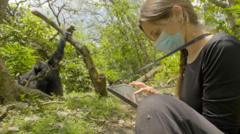The study, published in the journal Frontiers in Ecology and Evolution, reinforces the understanding that several primates, including chimps, orangutans, and gorillas, utilize natural remedies to promote health in the wild. Lead researcher Dr. Elodie Freymann discussed the range of behaviors that chimpanzees exhibit when they are injured or ill, indicating they incorporate plant-based treatments to maintain hygiene.
Notably, the researchers viewed recordings of a juvenile female chimpanzee applying chewed plant material to her mother's wound and instances of chimps aiding unrelated individuals with wounds. This suggests that chimps possess empathetic abilities, enhancing our understanding of their social dynamics.
The researchers sourced information from decades of anecdotal evidence housed at the forest field station, documenting chimpanzee behaviors since the 1990s. Many interesting observations, such as healing techniques and hygiene actions, were noted, with some chimps utilizing leaves for post-defecation cleaning.
Previous studies have identified and tested the antibacterial properties of plants that chimps consume when injured, showcasing the potential for plant-based medicines in human health. Moreover, new findings of wild orangutans using similar treatments further illustrate that non-human apes have knowledge of medicinal plants.
Researchers stress that understanding chimpanzees' use of plant medicine may unlock new therapeutic avenues, emphasizing the deeper lessons humans can learn about survival and the interconnectedness of nature. According to Dr. Freymann, chimpanzees possess extensive knowledge of their environment, allowing them to thrive under circumstances where humans might struggle.
Notably, the researchers viewed recordings of a juvenile female chimpanzee applying chewed plant material to her mother's wound and instances of chimps aiding unrelated individuals with wounds. This suggests that chimps possess empathetic abilities, enhancing our understanding of their social dynamics.
The researchers sourced information from decades of anecdotal evidence housed at the forest field station, documenting chimpanzee behaviors since the 1990s. Many interesting observations, such as healing techniques and hygiene actions, were noted, with some chimps utilizing leaves for post-defecation cleaning.
Previous studies have identified and tested the antibacterial properties of plants that chimps consume when injured, showcasing the potential for plant-based medicines in human health. Moreover, new findings of wild orangutans using similar treatments further illustrate that non-human apes have knowledge of medicinal plants.
Researchers stress that understanding chimpanzees' use of plant medicine may unlock new therapeutic avenues, emphasizing the deeper lessons humans can learn about survival and the interconnectedness of nature. According to Dr. Freymann, chimpanzees possess extensive knowledge of their environment, allowing them to thrive under circumstances where humans might struggle.




















